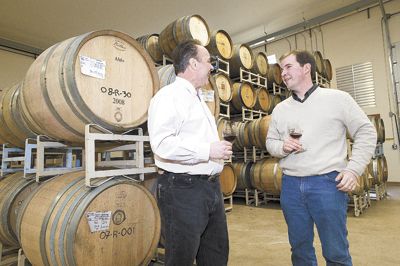Hear Ye on Land Use

By Hannah Hoffman
A four-member panel of local experts dissected a seven-element package of proposed legislation at a recent meeting organized by the land-use advocacy group Friends of Yamhill County. The unifying thread was commercial activity in farm zones, particularly that generated and hosted by elements of the wine industry.
The wine industry has become increasingly annoyed at inconsistencies between the widely varying approaches different counties have taken. Washington County tends to be much stricter than Yamhill County in its interpretation and implementation of state rules, for example, and that is widely perceived as giving Yamhill County wineries an unfair competitive advantage.
The Legislature’s first attempt at standardizing the various approaches taken by different counties was Senate Bill 1055, enacted last year. Realizing it was just a stopgap for legislation that needed to be more comprehensive, it was deliberately given a 2013 sunset date.
But the industry isn’t the only interested party.
Rural residents are concerned over the size and frequency of concerts and other special events elements of the industry are prone to host as part of their promotional efforts. And groups like Friends of Yamhill County are sympathetic to such concerns.
The panel consisted of Yamhill County Planning Director Mike Brandt, Tina’s restaurant owner David Bergen, Winter’s Hill Vineyard co-owner Russell Gladhart and Department of Agriculture land use expert Jim Johnson. Together, they examined seven bills:
HB 2341, created by the Association of Oregon Counties, would take a tiered approach toward regulating the size and frequency of promotional events. Yamhill County Commissioner Mary Stern chaired the task force that developed the legislation, and counted Brandt as a member.
HB 2344, developed by the House Agriculture committee, is more comprehensive in scope. So is SB 940, developed by the Oregon Winegrowers Association.
HB 2868 would establish “temporary” and “seasonal” food service licenses for wineries.
Many wineries use catering companies to circumvent rules barring restaurant operations in farm zones, but many feel catering may not fully meet the test of the law either. The special permits would avoid the problem.
HB 3280 and SB 829 would get around the problem in a different way. They would allow the large-scale wineries to establish full-fledged restaurants on their premises.
Johnson said the bill was designed to accommodate Lane County’s King Estate, which he said has been running an illegal restaurant for years.
Finally, there is HB 3234, which would allow wineries to process other kinds of fruit along with grapes.
Johnson said he expects elements of several of the bills to be incorporated into a single, comprehensive plan before all is said and done. He said he’s hoping the result will be a flexible but consistent mechanism for counties to use in siting wineries in farm zones in the first places and regulating their promotional activities afterward.
He said it needs to include an adequate legal definition of “winery,” which has yet to be developed.
Brandt largely agreed with that assessment.
He said the main focus needs to be on the raising of grapes and making of wine. He said any promotional events need to be both complementary and subordinate.
Johnson and Brandt also agreed that wineries have no business maintaining restaurant operations in their rural settings, HB 3280 and SB 829 notwithstanding. And that drew strong support from Bergen.
Bergen said urban and rural areas have to complement and support each other in a tourism-based economy. He said tourists come to Yamhill County to visit wine country, but end up spending much of their money on food and lodging needs best met in town.
He said it’s important to have thriving towns supporting the wine industry. And that’s best accomplished when urban and rural don’t encroach on each other’s turf, he said.
Gladhart said the industry largely accepts Brandt’s premise that commercial and promotional activities must remain secondary. However, he said Oregon is heavily populated by boutique wineries dependent on direct sale to visitors, and it takes organized activities to attract those visitors.
Gladhart also said food and wine are traditional partners of long standing, and wine serves a celebratory function associated with dining. So he said winery events need rules permitting a food component.
Hannah Hoffman is a report for the News-Register.









